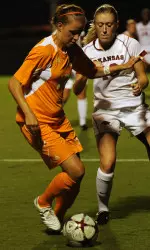University of Tennessee Athletics

International Players Thrive in Tennessee's Soccer Program
September 14, 2011 | Soccer
Sept. 14, 2011
BY LESLIE SALOOM
UTLadyVols.com
Soccer is the world's game, and some of that global influence can felt on Tennessee's campus.
Three Lady Vols - junior Amy Harrison, freshman Alison Clarke and sophomore Sanna Saarinen - bring significant international experience to Knoxville.
"These three young ladies are aspiring to play at the highest level," coach Angela Kelly said. "Their attitudes are fantastic. They show up ready to work every day, and as a coaching staff, that's all we can ask. They do everything they are asked to do off the field and academically, and they represent the Lady Vols soccer program with great pride and honor."
All three of UT's international players know something about pride and honor, having played for their respective national teams.
Harrison, a midfielder from Winnipeg, Manitoba and an SEC All-Freshman choice in 2009, was a two-year member of the Canadian Under-17 Women's World Cup squad. Clarke started 15 matches as a defender and earned a gold medal with Team Canada at the 2010 CONCACAF Women's U-17 Championship.
Midfielder Sanna Saarinen is a native of Espoo, Finland, and the first Finnish player for the Lady Vols soccer program. In 2009-10 she was a member of Finland's Under-19 Women's National Team.
All three played significant time internationally, but there's as much difference between playing for a national team and playing for Tennessee as you might think. And there's definitely more connection between teammates at the college level, even if the national bond isn't a shared one.
"I would probably say team wise, [at UT] we are always with these girls, so you get more of a collaboration of your team and understand better what everybody is going to do on the field," Harrison said. "Playing on your national team, we are not able to be with our teammates for long periods of time. We would come together for camps and games about every two months."
The drive, though, is the same.
"The stakes are high for international games but they are just as high here," Harrison said. "You are competing for something totally different."
Kelly understands both.
Before and after helping North Carolina win four NCAA titles as a player, Kelly spent nine years as a member of the Canadian national team. In 2004, she became one of 11 new inductees - and just the third woman - to The Canadian Soccer Hall of Fame.
"Certainly for any young lady that can represent their country, there is no greater honor," said Kelly, who was born in Scotland but grew up in Brantford, Ontario. "I have represented the country where two of them are from, so that's just a bond in itself. "
That understanding is something Saarinen noticed during the recruiting process.
"I know she knows what it's like to come to the U.S. as a foreign student-athlete and that's helped a lot," Saarinen said. "Fighting for international students to come here takes a lot of work so she definitely made it worth it."
Moving to a different country usually requires an acclimation period but fortunately being an international student-athlete comes with something of a built in family.
"We have been to so many places that it really wasn't too hard to be culturally adjusted here," Harrison said. "The team just brought us right in. Many teammates have families that come all the time so they take us under their wings."
The cultural differences - and the colloquialisms - are a bit of a two-way street, Clarke said.
"Adjusting to the southern culture and language is different," she said. "They make fun of us for what we say, but we think what they say is weird."
Even having people say anything can be odd. For Saarinen, the friendliness of southerners took a little adjustment.
"People are also so friendly and social here. Someone you don't even know might come right up to talk to you," Saarinen said. "I am not used to that. In Finland, they just sort of keep to themselves."
And when it comes to the team, which is off to a 6-1 start, there's no such thing as keeping to oneself. Kelly makes sure that her players embrace the team culture.
"The understanding of the game and language is there," Kelly said. "The culture of the team is very accommodating, and we really encourage that so it is an easy transition."













